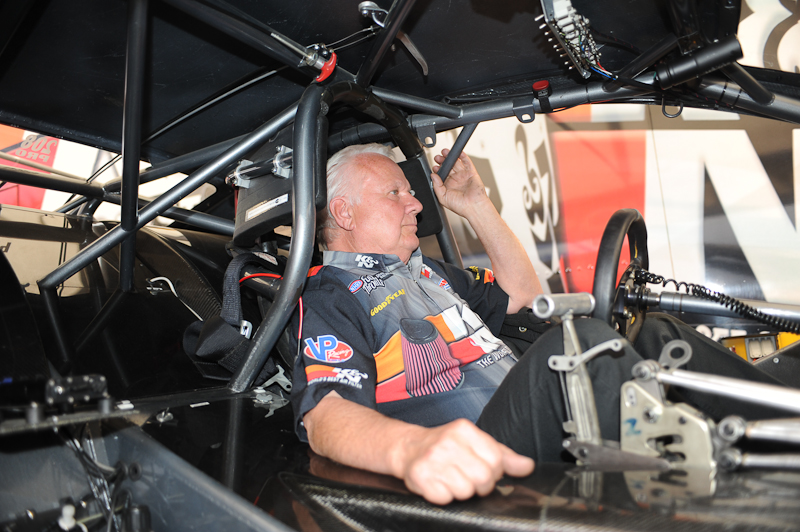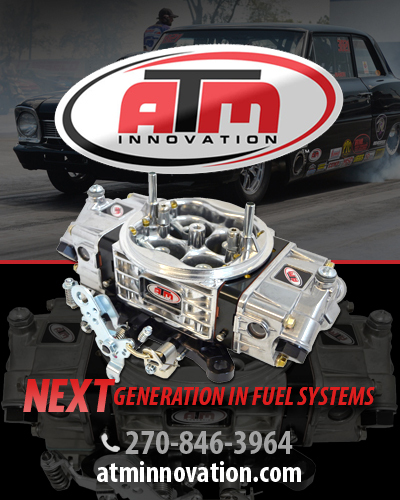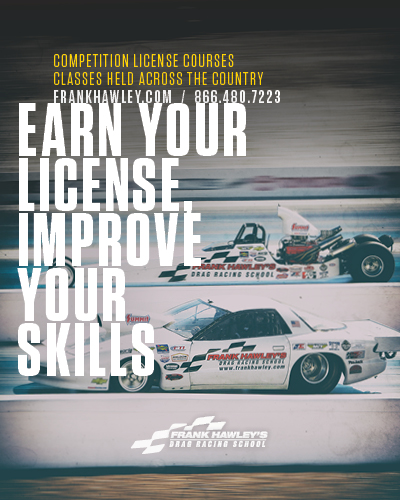PRO STOCK’S OLD MASTER – WJ JUST KEEPS ROLLIN’ ALONG
 Warren Johnson is the last of the old breed. He may not be the oldest Pro Stock competitor chronologically, but in this instance “old breed” refers to that select few who have been fortunate enough to have dominated at one point or another during their careers. Bob Glidden hung up his helmet a long time ago. Darrell Alderman parked his Dodge when his eyesight failed (the Mopar PR people claimed it was due to a back bad, but he could no longer see the finish line, and they wanted to cover that up.). Jeg Coughlin, Jr. is obviously still very active, but by and large, the days of total domination in the class seem to be over if for no other reason than the quality of the competition.
Warren Johnson is the last of the old breed. He may not be the oldest Pro Stock competitor chronologically, but in this instance “old breed” refers to that select few who have been fortunate enough to have dominated at one point or another during their careers. Bob Glidden hung up his helmet a long time ago. Darrell Alderman parked his Dodge when his eyesight failed (the Mopar PR people claimed it was due to a back bad, but he could no longer see the finish line, and they wanted to cover that up.). Jeg Coughlin, Jr. is obviously still very active, but by and large, the days of total domination in the class seem to be over if for no other reason than the quality of the competition.The term “politically correct” and Warren Johnson remain mutually exclusive. The man speaks his mind in 2010 just as he did in 1970. Totally unafraid of the ramifications of his words, “The Professor” has never been one to mince words with NHRA, the media or his fellow racers. Back in the days of the long-gone Pro Stock Owners Association Johnson and Glidden both offered to fly to California and open their books for NHRA management to show them exactly how much it was costing to compete. NHRA declined the opportunity, and by and large remains in the dark as to the rapidly escalating costs of racing in Pro Stock. It’s a scenario they appear to relish, for without the facts and figures in front of them they can speculate as to the costs forever without having to face the harsh reality of what the racers face week to week.

Warren Johnson is the last of the old breed. He may not be the oldest Pro Stock competitor chronologically, but in this instance “old breed” refers to that  select few who have been fortunate enough to have dominated at one point or another during their careers. Bob Glidden hung up his helmet a long time ago. Darrell Alderman parked his Dodge when his eyesight failed (the Mopar PR people claimed it was due to a back bad, but he could no longer see the finish line, and they wanted to cover that up.). Jeg Coughlin, Jr. is obviously still very active, but by and large, the days of total domination in the class seem to be over if for no other reason than the quality of the competition.
select few who have been fortunate enough to have dominated at one point or another during their careers. Bob Glidden hung up his helmet a long time ago. Darrell Alderman parked his Dodge when his eyesight failed (the Mopar PR people claimed it was due to a back bad, but he could no longer see the finish line, and they wanted to cover that up.). Jeg Coughlin, Jr. is obviously still very active, but by and large, the days of total domination in the class seem to be over if for no other reason than the quality of the competition.
The term “politically correct” and Warren Johnson remain mutually exclusive. The man speaks his mind in 2010 just as he did in 1970. Totally unafraid of the ramifications of his words, “The Professor” has never been one to mince words with NHRA, the media or his fellow racers. Back in the days of the long-gone Pro Stock Owners Association Johnson and Glidden both offered to fly to California and open their books for NHRA management to show them exactly how much it was costing to compete. NHRA declined the opportunity, and by and large remains in the dark as to the rapidly escalating costs of racing in Pro Stock. It’s a scenario they appear to relish, for without the facts and figures in front of them they can speculate as to the costs forever without having to face the harsh reality of what the racers face week to week.
Johnson’s recent outbursts haven’t endeared him to the fuel racers, but he could care less. He continues to push the point of the fuel cars representing a very small percentage of the total number of vehicles involved in the sport, and while that may be true, he continues to believe that NHRA gives them preferential treatment. It’s an argument we can’t settle, so we won’t try.
Despite the antipathy the nitro-burners may feel towards Johnson, the vast majority of them, particularly those with enough years behind them to have seen how dominant Johnson can be, have grudging respect for his work ethic. Simply put, no one appears to have ever worked harder than Johnson and Glidden. Both were known to leave the dyno room only long enough to stuff down some turkey and dressing on Thanksgiving before heading back for another engine run-up later that evening. Johnson, along with his son Kurt, appears to be maintaining that same frantic work pace even now, in his 67th year. Maybe that’s why he’s got almost 100 national event wins to his credit.
Hard work and honesty are hallmarks of the Warren Johnson persona, and it’s reflected in everything he does. Listen to him outline what it’s like trying to find quality workers these days as compared to 20 years ago. “They may come here with more skills then in the past, and even that’s debatable, but what they don’t have is the enthusiasm, and in a lot of cases, the integrity (of previous employees). Attitude is first and foremost,” he says. “Aptitude is something else again, because I can train ‘em about what’s needed to be done. In terms of the attitude thing, I’ve seen a lot of people who appear to want to be paid for doing nothing. They’re qualified to be a government employee!” Motivation is something Johnson has never been short of. Even now he says, “I still have a little fun at (drag racing), and it’s better than a (regular) job! I can afford to quit if I want, or I can do this for entertainment.” That last is said with the expected wicked little grin.
Motivation is something Johnson has never been short of. Even now he says, “I still have a little fun at (drag racing), and it’s better than a (regular) job! I can afford to quit if I want, or I can do this for entertainment.” That last is said with the expected wicked little grin.
Above all a realist, Johnson knows that at his age younger drivers may have quicker reactions, but he’s unwilling to simply cede them victory. “Certainly reactions don’t get better. That’s a given. But I do think experience has helped me make more successful runs than most people.” By “successful” WJ means getting the most out of the car on any given run regardless of the conditions. He’s quite correct, too. If you had the time or inclination to go back over possibly years worth of qualifying session results you’d find many instances of supposedly quicker and faster cars faltering when Johnson’s car made good, straight runs and recorded competitive elapsed times for the prevailing conditions.
When it comes to engine building Johnson says that “in some cases I get more satisfaction out of that now than I did 30 years ago, because finding horsepower now is a lot more finite than it used to be. Before we could find 20, 30, 40 horsepower relatively easily. Now we’re looking for the 2s and 3s, kinda like restrictor plate racing. That really motivates me into thinking more deeply about (finding more power).”
It’s well known that Johnson has built some engines for NASCAR racers, and as he says, “Sometimes they ran embarrassingly faster than their own stuff did. We proved the point that we could do something they couldn’t.” Johnson’s main foray into that arena was for Junior Johnson’s team and no, they aren’t related. The only reason he didn’t “stray” to the Dark Side permanently was that “I had more interest in (drag racing) than I did in (NASCAR) at the time. I had some pretty lucrative offers to go over there and do that, but I enjoyed what I was doing already. Hindsight being what it is, maybe I should have gone over there. I just don’t know.”
The Professor isn’t averse to supplying engines for other Pro Stock competitors, but as he says, “I’d have to look at the situation carefully. If I elect not to drive I may run a team with another driver in place of me. If there was a handsome enough offer on the table so that Kurt and I could financially benefit from supplying engines we would take a serious look at it.
“We would only supply engines on an exclusive basis and only if we weren’t racing. I wouldn’t want there to be any speculation that (our customers) weren’t getting the best possible pieces. There’s been a lot of attempts by other people to supply engines to their competitors, and there’s always been that agonizing thought that the customer was getting second best. I don’t want to be caught in a situation like that.”
When it comes to his “relationship” with NHRA he says, “I never considered I had any relationship with them. When I see an error I’m not afraid to point it out (to NHRA). I try to look out for the betterment of the sport, not for (my) personal benefit. That’s the least of my worries. If this sport doesn’t remain healthy none of us has a job.”
Recognizing that there has been talk of having Pro Stock run to 1000 feet at some point in the relatively near future, Johnson first addresses what he considers the financial “penalty” for doing so. “I estimate that if they did that each car would face an additional investment of at least $20,000 in parts alone to keep performance at the maximum. Why should we bear the financial burden of NHRA not doing what they were supposed to do 10 years ago (with track preparation).”
Those who don’t see Johnson in action often speculate that he must shun the fans and hate signing autographs. Nothing could be further from the truth. “It’s never been difficult for me to interact with the fans,” he says. “I’ve always allocated a certain amount of time every day for autographs and so forth. I enjoy it and think I’ve always had a pretty good relationship with the fans.
“I fully realize that they’re the paying customer. There’s only two entities that matter out here. That’s the spectators, first and foremost, and the sponsors are second. The racers and the sanctioning body can both be replaced.”




































